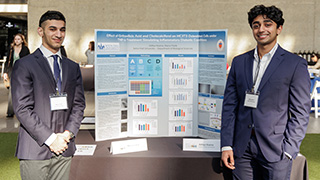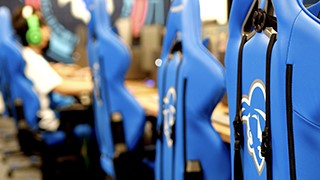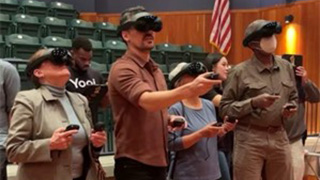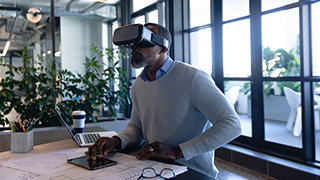Seton Hall Sports Poll Shows One Third of Americans Say Sports on TV a Positive for Mental Health in Pandemic; Majority Say March Madness Bubble Fair to Student Athletes
Thursday, March 18, 2021
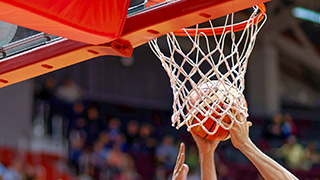
Of "sports fans," that number goes to 69 percent, and of "avid fans," 80 percent. Forty-eight percent of those who call themselves "non-fans" still think it is fair.
Sports Has Positive Effect on Mental Health Over Past Year
Perhaps to some extent that view has been tempered by a sense of need. The Poll found that sports on TV – even without fans – has had a positive effect on the American psyche over the course of the last year. Thirty-nine percent of the general population – self-described fans and non-fans alike – say that sports on TV has had a positive effect on the mental health of most Americans, while 33 percent cite sports as being beneficial to their own mental health.
Those numbers rise, understandably, amongst sports fans. Seventy-three percent of avid fans believe that sports on TV has aided in bolstering the country's mental health during the pandemic, with 60 percent saying it has helped their own. Among sports fans in general, 47 percent believe it has helped the nation, while more than half – 51 percent – say it has helped them personally.
"The pandemic has taken its toll on all of us," said Professor Juan Rios, a licensed clinical social worker and director of the graduate Master of Social Work program at Seton Hall University. "Sports has offered us a much needed outlet from social isolation and has functioned in some ways as a coping mechanism, providing an extension of community through collective spectatorship and camaraderie. Sports on TV has provided us with a feeling of at least some level of normalcy in an otherwise abnormal time."
These were the findings of a Seton Hall Sports Poll conducted among 1,538 adults geographically spread across the country March 13-15, with a margin of error of +/-3.2 percent.
Sporting Event Attendance, Indoors Ticking Upward
Sports on TV is one thing, but attending events – even with a vaccine – is still apparently another. The Seton Hall Sports Poll has been tracking people's willingness to attend indoor and outdoor events throughout the pandemic, and the shift in attitudes, while dramatic between November and January, has been fairly consistent from January till now. Asked how they would feel about attending an indoor event if vaccinated, 35 percent of the general population said yes, up just three percent since March. Among sports fans, 49 percent said yes to indoor events, up three percent from March, and 16 percent of non fans said yes, up from 14 percent in January. However, this is a far cry from the results at the beginning of the pandemic. At the beginning of April 2020, 72 percent told the Seton Hall Sports Poll they would not at all attend a sports event before a vaccine was developed.
Sporting Event Attendance, Outdoors also Ticking Upward
With baseball season just two weeks away, respondents were also asked about attending outdoor events if vaccinated, and 43 percent of the general population said yes, a number which rose to 61 percent among sports fans and 75 percent among avid fans. Like indoor events, those numbers were up between 2-4 percentage points since the question was asked in January, 2021.
Opt Out?
Given the vagaries and mixed feelings of many regarding indoor sporting event attendance, the public was asked whether they thought there should be negative consequences for student-athletes who choose to not play in that environment. Asked whether a player should be able to choose to "opt-out" of the NCAA basketball tournament without impacting their scholarship, 61 percent of the population said yes, with 68 percent of sports fans, 77 percent of avid fans and 52 percent of non-fans agreeing.
Covid Liability Waiver Equals Employee?
Forty-three percent of the general population felt that having to sign a Coronavirus (COVID-19) liability waiver, as many student athletes have had to in order to play their sport on campus, was sufficient indicia of employment such that the student-athletes should be compensated beyond their scholarships. Among sports fans, that number rose to more than half at 51 percent, and to 65 percent, nearly two-thirds, for avid fans. Interestingly enough, even among non-fans nearly one third, 32 percent, thought the signing of a coronavirus liability waiver should entitle the student-athletes to compensation.
"Whether we're talking about their contribution to the nation's mental health, or having to sign covid liability waivers like so many other employees across the country, it seems clear that student-athletes are considered essential and considered to be workers," said Professor Charles Grantham, Director of the Center for Sport Management within the Stillman School of Business, which oversees the Seton Hall Sports Poll. "And if they're considered essential workers, they should be compensated as such."
People in Pools or Brackets Has Doubled Since Pre-Pandemic
Fifty-six percent of avid fans will be filling out a bracket for the tournament or have already, but that number drops to 30 percent for "sports fans," 18 percent of the general population and not surprisingly, just 3 percent of non-fans. When this question was asked pre-pandemic (March 2019), only nine percent of the general population said they would be participating in pools involving money.
Should You Be Able to Wager on March Madness?
Asked if sports betting should be allowed on any NCAA tournaments featuring student athletes, 62 percent of avid fans registered a yes, and 45 percent of sports fans agreed. Only 33 percent of the general population said yes, although 36 percent said no, and 31 percent did not know or had no opinion.
"This year's doubling to 18 percent is a number worth watching, said Marketing Professor and Poll Methodologist Daniel Ladik. "We've seen other sports betting numbers trend upwards this year, and one wonders how much the wider availability of legal sports betting and the ubiquitous advertising that accompanies it is contributing to this trend."
Categories: Athletics, Business, Nation and World

